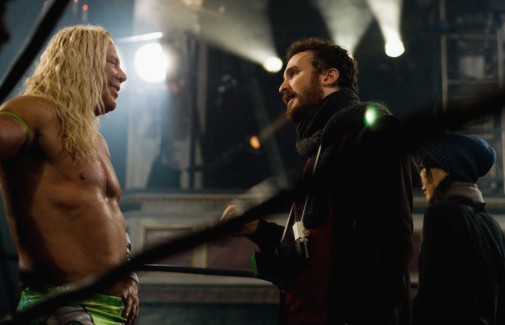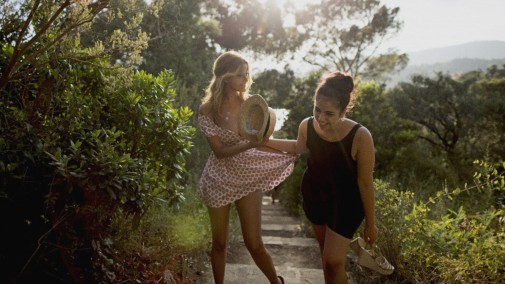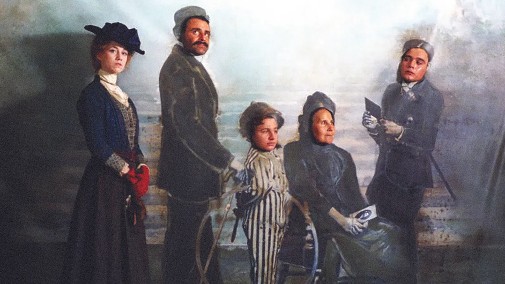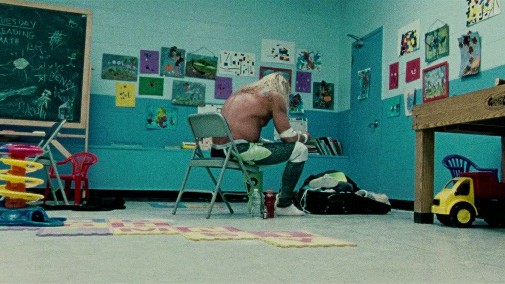Venice at Home – Day 5: Returning Champions
 Monday, September 5, 2022 at 10:24AM
Monday, September 5, 2022 at 10:24AM 
The fifth day of competition finds three award-winning filmmakers vying for more golden plaudits. Rebecca Zlotowsky's directorial works have left strong impressions across some of Europe's biggest festivals, and this is her first time in Venice. Her new film, Other People's Children, stars Virginie Efira and Roschdy Zem – he's also in competition as a director with a different film. Next, Italy's Emanuele Crialese returns with L'immensità after nabbing nine prizes in past editions of the festival. Finally, there's Darren Aronofsky who is a former Venice champion whose new project, The Whale, is already enshrined in Best Actor Oscar buzz for Brendan Fraser.
So today we're looking back at Aronofsky's 2008 Golden Lion winner, Zlotowsky's sensual summer, and Crialese's voyage to the New World…

AN EASY GIRL (2019)
While watching Rebecca Zlotowski's An Easy Girl, one's mind will inevitably drift into Rohmerian divagations. The summery setting certainly appeals to that earlier auteur's preferred aesthetics, and so does the model of sex talk as a conduit for reflections on morality, philosophy, human behavior. The plot also feels like an inversion of Rohmer's beachside tales. Moreover, the modern movie opens with a quotation from 17th-century thinker Blaise Pascal, who was so deeply discussed in Rohmer's My Night at Maud's. Juxtaposed over a resplendent beach, it reads "The most important thing in life is to choose a profession: chance arranges for that."
But what is a profession? What isn't? What is labor? Such questions become a central point of Zlotowski's film. The picture is something of a study on feminine perceptions of sexuality and the sexual experience. We come to these conclusions by observing the story of Naïma, a 16-year-old Cannes local who's decided that, by fall, she'll have chosen what to do with her life. Along comes her cousin, Sofia, intent on spending the holidays by the sea. Beautiful and liberated, the older woman uses her sex appeal to attract men and to enter worlds of wealthy exclusivity.
The camera lingers on her body, embodying the male gaze but depicting a curated image that she herself is actively projecting. When two wealthy travelers cross the horizon on their private yacht, the cousins find their way into their luxurious lifestyle, if only for a short while. Zahia Dehar, a reality TV star and tabloid ficture, plays Sofia who is the kind of character mainstream culture and movies tend to look down upon and judged. Zlotowski refuses such retrograde notions, allowing Sofira to emerge as a set of contradictions, philosophies of self-interest, and objectification.
Sofia makes herself a fetish object, and with that comes a sort of power that shouldn't be confused with powerlessness. No matter how much the men might assert their control, this is a celebration of sexual agency on the women's part. Thorny and complicated, An Easy Girl isn't an easy watch, often working within a milieu of contrasting forces and divergent ideas. Its breeziness is an illusion, every superficiality laden with provocation. Though one would suppose that incitement to be carnal, Zlotowski's piece appeals to the intellect, matters of class, and social hierarchies. Perhaps the voice-over narration is a step too far, laying the textual problematizations in a bare and conspicuous manner, but it also aids the viewer, guiding them with purpose.
An Easy Girl is streaming exclusively on Netflix.

GOLDEN DOOR (2006)
Just as its characters cross the Atlantic, from rural Sicily to New York City so does Emanuele Crialese's Golden Door go on a journey from naturalism to allegory. Divided into three neat acts, the film chronicles the Mancuso clan's intercontinental odyssey. We meet them in their homeland at the beginning of the 20th century, every frame a painting of squalor and splendor. Cinematographer Agnès Godard abides by her director's strict structure, but one can sense the seeds of unreality being planted throughout the film's first segment. Its beauty holds the possibility for abstraction and reverie.
Apparent signs from God convince the patriarch, Salvatore, to take his family to America, believing it to be a land of miracles, where vegetables grow giant and people swim in milk. At the moment of departure, they cross paths with a mysterious Englishwoman intent on entering the States alongside the family and marrying Salvatore. The story of Lucy is never fully explained, though the camera often lingers on her incongruous figure. To travel across the ocean isn't easy, a painful second act that gives way to an even more painful third. Once the immigrants arrive, Ellis Island becomes a stage for humiliation and rejection, a limbo-like prison with frosted glass windows that block the view of Lady Liberty.
Though Criasele's script is meandering to a fault, dropping elements and grabbing onto others with apparent aimlessness, his vision makes up for that. If Godard's lensing shines, it's also because it observes a lived-in world rich in historical detail, exciting color stories, and unique faces. Casting, makeup, costume, and set design – every department works overtime to deliver a true experience, facilitating the tonal straying into Biblical symbolism and magical realism. Faith is a significant point of interest, a tenet for every person on screen, even the ones left behind in the Old World. Through that belief, golden dreams can blossom, and ghosts lost to time can live again.
Golden Door is available to rent or purchase on Amazon Video.

THE WRESTLER (2008)
Ever since it was announced, I've been apprehensive about The Whale. Sterling reviews give me hope, but Samuel D. Hunter's play is a tricky text easily skewed by anti-fat bias. The fact that Brendan Fraser wears a fat suit and heavy prosthetics doesn't help. Even so, I'm eager to experience the film and make an informed judgment, whether positive or not. One thing's for sure - there's precedent in Aronofsky's career for a vaguely similar story resulting in exceptional work, complete with Venice Film Festival acclaim and an Oscar-worthy actor in the lead. The best way to promote The Whale is to connect it with Aronofsky's most humanistic and generous character study, The Wrestler.
Built around star Mickey Rourke from a script by Robert Siegel, the film could be interpreted as a quasi-meta commentary on its central performer. And yet, whatever conclusions it comes to are never callous or reductive. Instead, the picture unravels a muscular melodrama with touches of Bressonian grace amid a milieu where exploited bodies are the material from which spectacle is made. Critically, the director's trademark heavy-handedness is absent from the procedures, substituted by a peering eye that's as compassionate as it is probing. Compared to something like Requiem for a Dream, Black Swan, or Mother!, it's positively minimalist.
That's not to say the movie is drab-looking or uninterested in form. On the contrary, Maryse Alberti's cinematography is a feat of dynamic camerawork, elegance on a canvas of rough, grainy textures. The music and sound work are equally exceptional, but they're all conceived in function to the characters and the actors who play them. Rourke is a galvanizing wonder, elevating the film and his achievement above tabloid notions of a comeback. I defy anyone to consider his performance with an open heart without feeling a tear forming. Marisa Tomei and Evan Rachel Wood offer solid support, making The Wrestler a story of human connection, the need for companionship, forgiveness, mayhap redemption.
The Wrestler is streaming on HBO Max, DirecTV, and the Cinemax Amazon Channel.
Considering the inevitable Fraserssaince to come, what's your favorite performance in a Darren Aronofsky film?



Reader Comments (3)
As great as Sean Penn is in Milk and whose story resonates more I still feel this was another time when an actor deserved it just a bit more.
The Wrestler is definitely a favorite of mine and I think it's Aronofsky's best film. I'm a fan of pro wrestling (not sports entertainment, that shit is for pussies) as I was into the story a lot and really wanted Mickey Rourke to win that Oscar.
Between taking away Sean Penn’s 2008 Oscar so that Mickey Rourke could win or taking away his 2003 Oscar so Bill Murray could win, I’m not sure which I’d prefer, but one thing is for sure: I’d definitely take away at least one of Sean Penn’s Oscars.